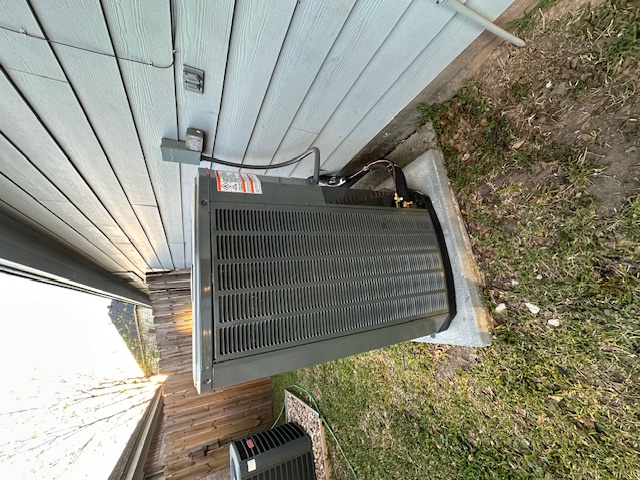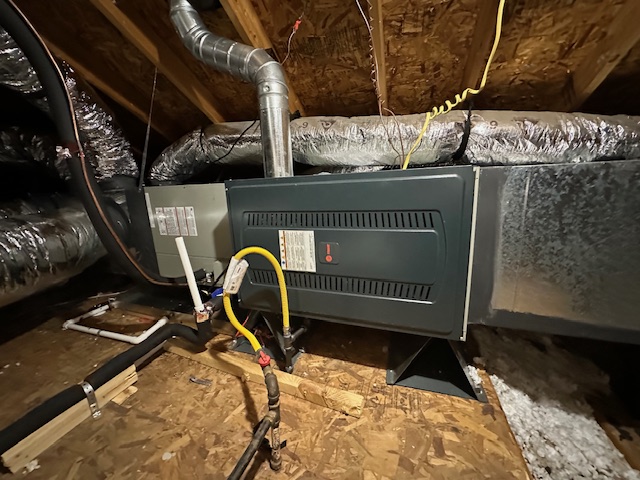As temperatures rise, an inefficient AC can lead to discomfort and high energy bills so knowing when it's time for a replacement can save you money and hassle in the long run.
We recommend considering an AC replacement if your unit is over 10-15 years old, requires frequent repairs, or causes a spike in your energy costs. These are key signs that your system may be nearing the end of its useful life. Other red flags include strange noises, uneven cooling, or unpleasant odors coming from the vents.
Recognizing the Signs of a Failing AC
A failing air conditioner often shows warning signs before it stops working completely. Knowing these signs can help catch problems early and avoid costly breakdowns.
Assessing Efficiency and Performance Issues
Watch for changes in your AC's efficiency and performance, including rising energy bills that can signal a struggling system. If your AC runs longer than normal to cool your home, it may need attention. Another issue is weak cooling and you may notice some rooms stay warm while others cool down.
Short cycling is another red flag. This happens when the AC turns on and off frequently without completing a full cooling cycle. It wastes energy and puts extra stress on the system. Frequent repairs are a clear sign of decline, for example, if you call for repairs more than once or twice a year, it might be time to consider a replacement.
Identifying Unusual Noises and Odors
Strange noises from the AC shouldn't be ignored, including banging, clicking, or squealing sounds. All can mean serious problems.
- Grinding or scraping: Possible motor issues
- Hissing: Potential refrigerant leak
- Buzzing: Electrical problems
Unpleasant smells are another warning sign, such as a musty odor that could mean mold growth in the system. A burning smell could also indicate an electrical issue and you should call a professional for assistance immediately.
Understanding the Impact of Weak Airflow
Weak airflow from vents is a common sign of AC trouble and can make homes feel stuffy and uncomfortable.
Causes of weak airflow include:
- Clogged air filters
- Frozen evaporator coils
- Blocked or leaky ducts
- Failing blower motor
High humidity indoors can also point to airflow problems as a working AC should remove moisture as it cools.
The Financial Aspect of AC Replacement vs Repair
Finances can be a deciding factor when choosing between AC repair and replacement. We'll look at how to compare costs, use the $5,000 rule, and figure out long-term savings.
Comparing Cumulative Repair Costs
AC repairs can add up quickly so you need to track how much is spent fixing the unit over time. If an HVAC technician is being called out often, those bills can match or exceed the cost of a new system.
Older units will likely experience more breakdowns and each fix gets pricier as parts become harder to find. At some point, buying a new AC makes more financial sense than constant repairs.
Applying the $5,000 Rule
The $5,000 rule is a handy tool for AC decisions. Here's how it works:
- Multiply the cost of repairs by the age of your AC unit in years.
- If the result is more than $5,000, consider replacement.
- If it's less, repair might be the better choice.
For example, if repairs cost $350 and our AC is 12 years old: $350 x 12 = $4,200.
This is under $5,000, so repairing it could be a sensible decision.
However, if repairs hit $500: $500 x 12 = $6,000. A replacement is likely the smarter option.
Calculating Long-Term Energy Savings
New AC units are much more energy-efficient than old ones, meaning lower monthly energy bills. This is an important factor when deciding to repair or replace. A new, efficient AC might cost more upfront but can save money over time through lower energy use.
Let's say a new AC saves $30 per month on energy: $30 x 12 months = $360 per year
Over 10 years, that's $3,600 in savings, offsetting the cost of a new unit to make a replacement more appealing.
Factors to Consider When Choosing a New AC Unit
Let's explore the benefits of expert advice regarding sizing and efficiency features to help you make the best choice.
Evaluating HVAC Specialist Recommendations
HVAC specialists can give us valuable insights. They will check your home's layout and suggest the best AC options, advising on the newest technology and local climate needs. Ask them about different brands and models and they can explain which features matter most.
HVAC experts can also explain installation costs and ongoing maintenance, helping you plan for the full cost of a new AC system.
Selecting the Right Size and Type of Air Conditioner
Getting the right size AC is crucial as a unit that is too small won't sufficiently cool your property, while an overly large unit will waste energy. To pick the right unit, consider your home's square footage, the number of windows, and the insulation quality. The local climate also plays a big role in sizing.
Central air conditioners work well for whole-house cooling, while ductless mini-splits are good for specific rooms or additions. Window units can be a budget-friendly choice for small spaces.
Considering Energy-Efficient Features
Energy-efficient ACs can slash power bills and you should look for units with high SEER ratings. SEER stands for Seasonal Energy Efficiency Ratio. The higher the number, the higher the efficiency.
Variable-speed compressors adjust cooling output as needed to save more energy while keeping temperatures steady. Two-stage cooling is another feature that can boost efficiency. Additionally, smart thermostats learn your habits and adjust the temperature automatically.
Maintaining Your AC for Extended Lifespan and Efficiency
Take care of your AC unit to help it last longer and work better. Regular upkeep, fixing problems quickly, and using good air filters are key to a smooth running system.
We recommend getting your AC checked by a professional at least once a year as this helps catch small issues early. During these checks, the technician will clean the coils, check refrigerant levels, and make sure all parts are working right. They'll also look for signs of wear and tear to identify potential issues.
Speak to us today to arrange an inspection of your AC unit.











